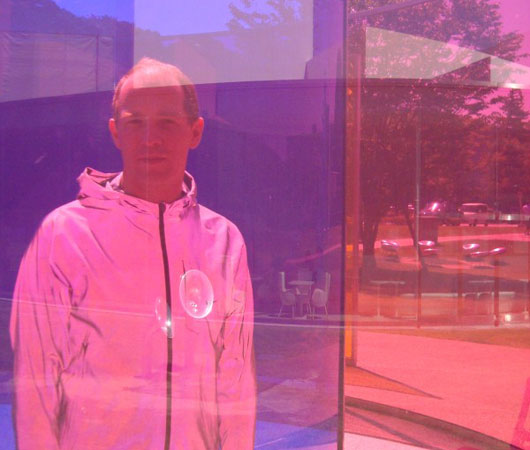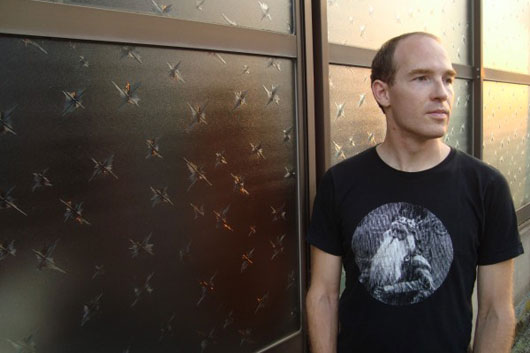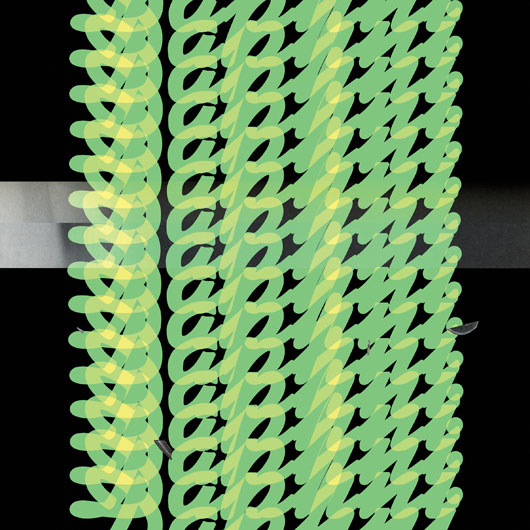Deep Inside: Daphni ‘Jiaolong’
In 2010, Caribou released Swim, a dense, deeply infectious album that took Canadian songwriter Dan […]

Deep Inside: Daphni ‘Jiaolong’
In 2010, Caribou released Swim, a dense, deeply infectious album that took Canadian songwriter Dan […]

In 2010, Caribou released Swim, a dense, deeply infectious album that took Canadian songwriter Dan Snaith’s intricate pop sound in a considerably more club-oriented direction. Unbeknownst to many, however, this time marked a schism of sorts in Snaith’s music. By the time of Swim‘s release, he had already quietly begun working under another name: Daphni, an even more expressly dance-oriented permutation of his musical psyche. Since then, he’s accumulated a wide-ranging array of tracks under this name, both released and unreleased, several of which have now collected on a full-length album called Jiaolong. Before it dropped this week on the Merge label, Snaith spoke with XLR8R over the phone from his London home, where he was preparing for a series of full-band Caribou live dates opening for Radiohead. Spliced into the schedule are some Daphni DJ sets, allowing his musical guises to exist rather neatly in parallel to each other—his endeavors as, alternately, a meticulous composer and an impulsive DJ/producer are, as Snaith makes clear, by no means dueling interests.
That said, while Snaith’s new persona may not be 100 percent wholly distinct and separate from Caribou—it is, after all, the same person making the songs—Daphni effectively splits up his musical identity, rendering the overall picture more complex yet also more compelling and complete. The name Daphni was chosen not only for its femininity, but also for its earthy, organic quality: daphni is the Greek word for bay leaf, an ingredient widely used for adding flavor to stews and soups. It’s a name that serves as a mission statement of sorts: much like the music itself, it references ideas not often explored in dance music, its earnest, rough-hewn form flying in the face of what Snaith characterizes as, “the really macho trend in dance music.”
Snaith’s interest in dance music extends back to the early days of his music listening, but his passion was rekindled most notably around 2008, when he and longtime friend Kieran Hebden of (a.k.a. Four Tet) began frequenting London club Plastic People. A particularly momentous night at that club, explains Snaith, was a Theo Parrish DJ set they attended after seeing Liquid Liquid play a live gig. “We walked in and he was playing a Liquid Liquid record,” he recalls. “The records Theo played that night were just amazing—they were so diverse and came from such a wide range of influences and sounds. A lot of them were quite deconstructed… [his set] reawakened me to the idea that there’s quite a lot of space within dance music to do interesting things.”

Compounding this reawakening was the fact that Snaith and Hebden themselves began to DJ at Plastic People. They would use these nights to test out tracks they were working on, integrating newly recorded original material into their sets. Much of the new material workshopped at this time would end up on Caribou’s Swim and Four Tet’s There Is Love in You, a similarly club-inspired record that came out that same year. “Bowls,” a song that ultimately ended up appearing on Swim, was one particular track Snaith tried out in this context, and it surprised him how much it made sense in that setting. “It doesn’t adhere to the arrangement ideas of a lot of the dance music I was playing it along next to,” he explains, saying that it left him wondering, “Is this a Caribou record or isn’t this a Caribou record?”
The names Caribou and Daphni, and the sound that Snaith associates with each, have recently come to assume more defined roles in his mind, but for quite some time, the line between these two recording identities was rather blurry and indistinct. In the process of making what would become Swim, he felt that there was some kind of shift happening in terms of his aesthetic preoccupations. “I felt like some of the songs could be Caribou music, and that’s the stuff that ended up on Swim,” he explains. “But there was also some stuff that seemed even more aimed at the dancefloor, distinct from the Caribou stuff.”
The Daphni moniker first appeared on a remix Snaith did of Cortney Tidwell’s “Watusii” back in 2009. “I really wanted to do something very club-oriented for that remix,” he says. “It seemed like as good an opportunity as any to test drive this new idea and try it out on a very low profile. Swim hadn’t even come out yet, so people were definitely not expecting that kind of thing from me.”
“Ye Ye,” the insistent centerpiece of Jiaolong and the first of its tracks to see release, was debuted at a much later Plastic People night alongside a new Four Tet track, “Pinnacles” (which now features on the latest Four Tet release, Pink). These songs went over so well on the dancefloor that the two of them decided to put out a split 12-inch with those tracks through Hebden’s Text label. “The next day, they were sent off to the pressing plant,” explains Snaith. “Within a few weeks, they were in shops, and we just printed off a few copies and they were gone.” The fuss-free efficiency of this release inspired Snaith to start his own label, Jiaolong (sharing its name with the album), which he launched last year with the release of a Daphni 12-inch. (He’s now releasing records by a few of his close friends as well, including Les Sins, a more dance-oriented project from Toro Y Moi’s Chaz Bundick, and a solo release by Jeremy Greenspan of Junior Boys, whom Snaith grew up with.)
Even speedier than the efficient release process has been the recording of the actual songs. Whereas Caribou tracks require a long period of time to take their intricate shape, all the Daphni tracks on Jiaolong were made in a single afternoon each, giving Snaith fresh fodder for live DJ sets. “I’d be preparing for a DJ set, and I’d think, ‘Oh man, I really want to have another track to play.’ I’d start working on a track, and would have to finish it by the end of the afternoon because I’d be getting on a flight to go somewhere and play that evening.”
The spontaneity of the equipment, working process, and release process associated with Daphni has proved an enjoyable counterpoint to Caribou. “There was no publicity on these [Daphni] records at all,” says Snaith. “I made the music, printed it up, and it went to shops, and then it went out of print, and that was it… It appeals to me as a record buyer and a record collector—this thing that’s there, you gotta grab it and it goes away again.”

Daphni’s fleet-footed immediacy has much to do with Snaith’s modular synthesizer, a piece of equipment he assembled himself that’s figured heavily in these tracks. A modular synthesizer can be personalized to the nth degree, and in the right hands, can make for some amazing sounds that aren’t easy to obtain with a store-bought synth. Getting the same sound twice, however, is quite difficult, which means taking what it gives, running with it, and seeing where it all goes. “It doesn’t allow you the possibility of going back and second guessing yourself,” Snaith explains. “You have to commit to the take—that’s gonna be it.” The result is “really quick, spontaneous music—it’s really tactile.” The synthesizer’s fickle nature means these tracks would be incredibly difficult to reproduce live, but with their impulsive feel, the songs lend the impression that they’re being produced right as the listener is hearing them.
With Caribou, says Snaith, he “spend[s] much more time finessing all the details and thinking about what the overall structure is going to be.” Furthermore, the most obvious thing that separates the two projects is that, on Caribou records, Snaith sings, and with Daphni, he does not. Granted, Caribou is not particularly about his voice; as Snaith explains it, Caribou is “about composition, writing songs, and the kind of harmonic and melodic content of what’s going on.”
Before becoming Caribou, his initial releases as Manitoba were dense, beat-driven clusters of splintered melody, easy on the ears yet tightly constructed and fully engaging. On later records like 2003’s Up in Flames and 2007’s Andorra, his sound took on a more psychedelic, overtly melodic air. Daphni, on the other hand, is considerably more raw and off the cuff. There’s no established formula, but each track establishes and toys with what Snaith sees as, “a real kind of collision of some sample or old recording, some textural thing, up against, say, a bassline from a modular synth.”

Nevertheless, what ties together Jiaolong is not so much this collision or the dancefloor-ready premise of the project—it’s the warm, tumbling, freewheeling feeling of it all. Five of the tracks have previously been released, while the remaining four come from the numerous tracks he’s amassed and subsequently sorted through. “It really surprised me how much the music sat together as a kind of coherent thing,” he says. Some tracks are sample based, but several don’t contain any kind of sample at all. “Light,” for instance, uses a surprisingly authentic-sounding software flute alongside drum machines and synthesizers in a track that feels improvised yet keenly attuned to what will keep people dancing. As Snaith points out, “it still has that idea of a collision of an electronic instrument with an acoustic instrument.” Tucked away on the LP’s second half is “Ahora,” another album highlight, which shows a darker, more contemplative side of Daphni. Above a faint, whistling melodic sample or bit of instrumentation (it’s hard to say which), a hissing house beat and synthesizers combine for a luminous slow burn that belies its speedy origins.
In addition to original Daphni tracks and remixes, Snaith has also released two Daphni Edits 12-inches on the Resista label, reconfiguring cuts by African and New Zealand groups, as well as Malian disco edit for the Sofrito label. An especially notable Daphni track in this vein is his remix of a track called “Ne Noya” by Togolese band Cos-Ber-Zam. The original track features on the only record the band ever released—a 7-inch from 1973. Snaith came across the track on a compilation entitled Afro-Beat Airways – West African Shock Waves. Analog Africa, which released the compilation in 2010, is a label that Snaith holds in high regard not only for its taste, but also for its insistence on getting consent from the original artists. Until Snaith came along with his remix proposition, the imprint had turned down every sample request it had ever received. An exception was made and Snaith was given permission to go ahead, but nobody knew who owned the publishing anymore, so it his effort had to be released as a remix rather than a new track that simply sampled the song. “It’s actually quite nice,” says Snaith, “because it draws attention back to the original music.” The remix, which is included on Jiaolong and is easily one of its most engaging tracks, takes one particular rhythm-and-vocal repetition from the song, and loops it into a hypnotic, fascinating dialogue with a bubbly modular synth.
On the whole, Jiaolong is an altogether surprising collection of tracks, offering music that’s soulful and light, yet rougher and often more urgent than Caribou’s more introspective bent. It’s appropriate, then, that Snaith cites dance music’s “potential to surprise” as his favorite characteristic of this musical realm. “Certainly a lot of dance music is predictable,” he explains, “but there’s absolutely nothing to say that you can’t completely change the palette of instruments that you’re using halfway through the song, or have a completely ambient section in the middle of the song.”
That lack of rules also extends to the realm of performance, as Snaith has no intention of developing a live rendering of Daphni; however, he does intend to continue to DJing alongside his ongoing Caribou songwriting efforts. He’s already made significant headway on a new Caribou record, and as long as he continues to DJ, he foresees a continuing need for new Daphni tunes. Regardless of whether Snaith is performing as a DJ or live band, he says, “I’ll want to play music that people haven’t heard.”

